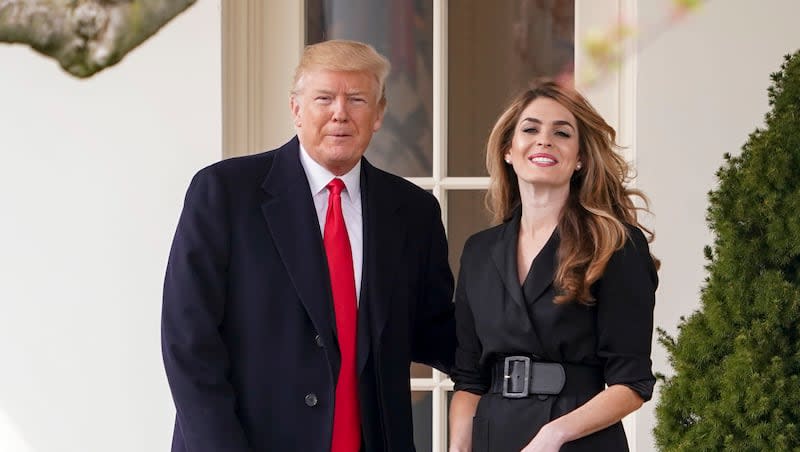Trump’s hush money case: Hope Hicks takes the stand

- Oops!Something went wrong.Please try again later.
- Oops!Something went wrong.Please try again later.
- Oops!Something went wrong.Please try again later.
- Oops!Something went wrong.Please try again later.
Hope Hicks, former White House adviser and communications director for Donald Trump before and during his presidency, was the final witness to take the stand on Friday in the former president’s criminal trial.
The prosecution questioned Hicks about her role as press secretary for Trump’s 2016 campaign, along with her actions taken following the release of the “Access Hollywood” tape. Hicks also shared her knowledge of the payment Trump’s former attorney Michael Cohen made to adult film star Stormy Daniels in 2016.
The payments made to Daniels are at the heart of the 34-count felony case against Trump brought on by Manhattan District Attorney Alvin Braggs. Braggs is accusing Trump of manipulating business records to hide the “hush money” payments leading up to his presidential election in 2016.
Trump has denied any wrongdoing, including his alleged relations with Daniels and other promiscuous actions that have been brought up in the case.
Describing her professional career working for Trump, Hicks said he was “a very good multitasker and a very hard worker. He’s always doing many things at once,” she said in her testimony, according to CBS News. In June of 2015, she added that she would speak to Trump nearly every day.
“Everybody that works there in some sense reports to Mr. Trump. It’s a very big and successful company, but it’s really run like a small family business in some ways,” she said.
Regarding working as his press secretary and seeing Trump’s strategy as a presidential candidate firsthand, she said, “It was just me and Mr. Trump, who’s better than anyone at communications and branding. ... Mr. Trump was responsible. He knew what he wanted to say and how he wanted to say it, and we were all following his lead. And so I think he deserves the credit in terms of the different messages the campaign put forth.”
Hicks’ encounter with the ‘Access Hollywood’ tapes
On Friday, prosecutor Matthew Colangelo also asked Hicks about her initial reaction to the “Access Hollywood” tape. In the recording — that was published by The Washington Post weeks before the election — Trump can be heard describing his ability to sexually assault women due to his stardom.
Hicks said she was “concerned, very concerned,” and somewhat “stunned” by the tape and “after getting an email requesting comment on the tape from The Washington Post before it broke the news, Hicks sent an email to other senior aides with possible responses, including, ‘Deny, deny, deny,’” per The New York Times.
She was also questioned about The Wall Street Journal article regarding former Playboy model Karen McDougal’s alleged 10-month affair with Trump.
When Colangelo asked Hicks about Trump’s reaction to the story, she said that Trump was concerned about the repercussions his presidential campaign would face but was more “concerned about how it would be viewed by his wife,” The New York Times added. “He was worried about his wife’s reaction and asked Hicks to make sure the newspapers weren’t delivered to their residence this morning.”
The former lawyer for Daniels and McDougal, Keith Davidson, previously testified regarding the negotiations made between him, Cohen and the National Enquirer to silence the women’s stories.
Additional testimonies
Hicks was the ninth witness to take to the stand in Trump’s criminal case. Along with Hicks, two additional witnesses testified on Friday: Georgia Longstreet and Douglas Daus.
Longstreet, a paralegal at the Manhattan D.A.’s office, which is prosecuting Trump, recounted her duties of tracking and documenting Trump’s social media activities, including a video statement he made after releasing the “Access Hollywood” tape.
While Daus, a forensic analyst for the D.A.’s office, discussed in his testimony a recording retrieved from Cohen’s phone that captured a discussion between Cohen and Trump concerning the financing of McDougal’s hush money agreement.

